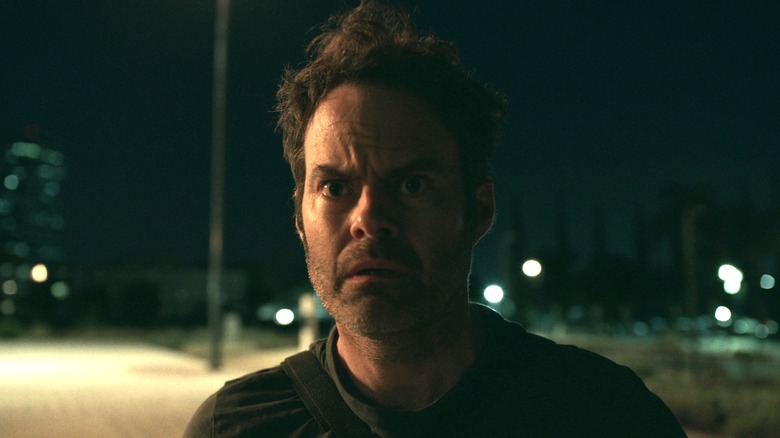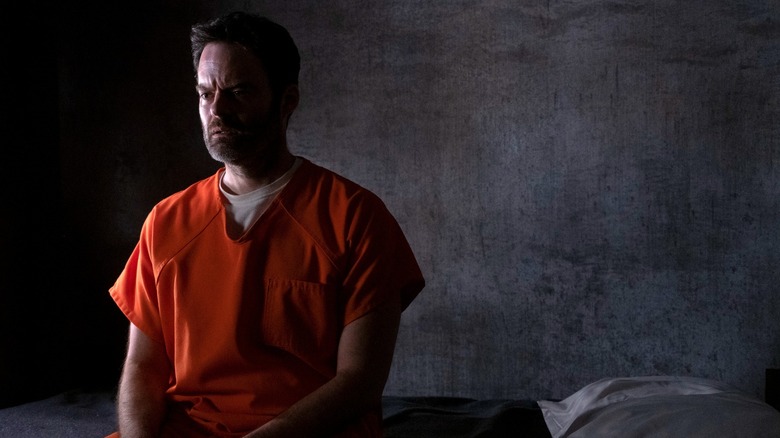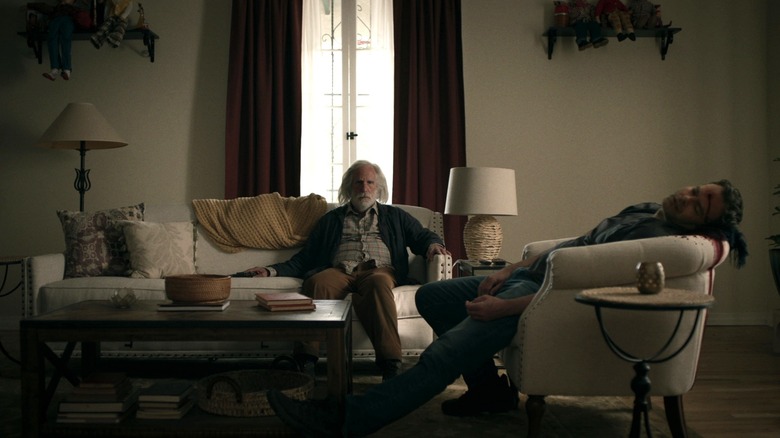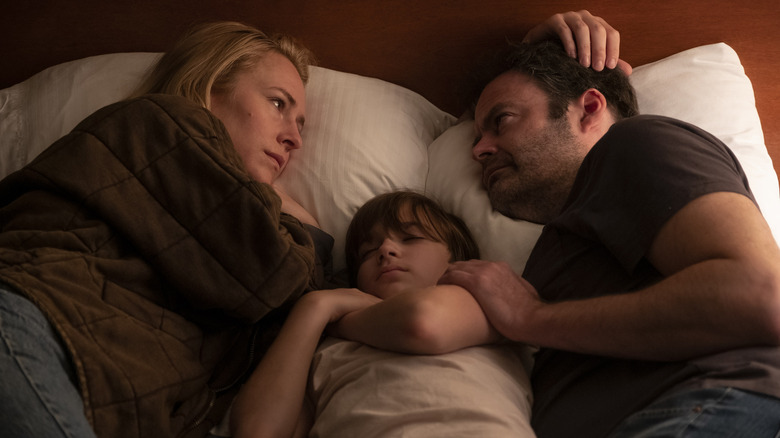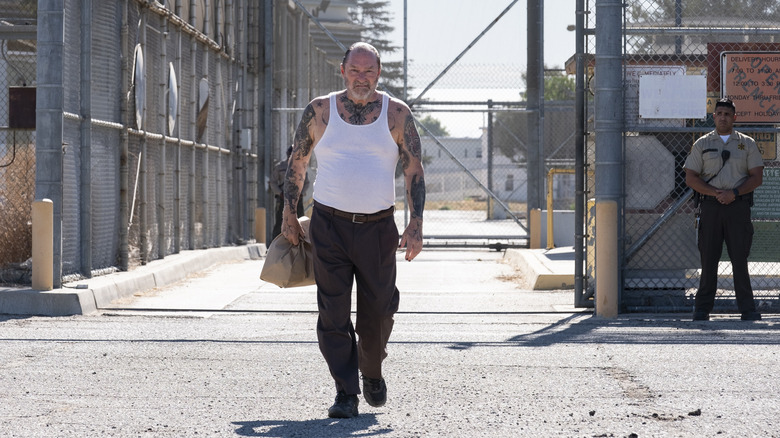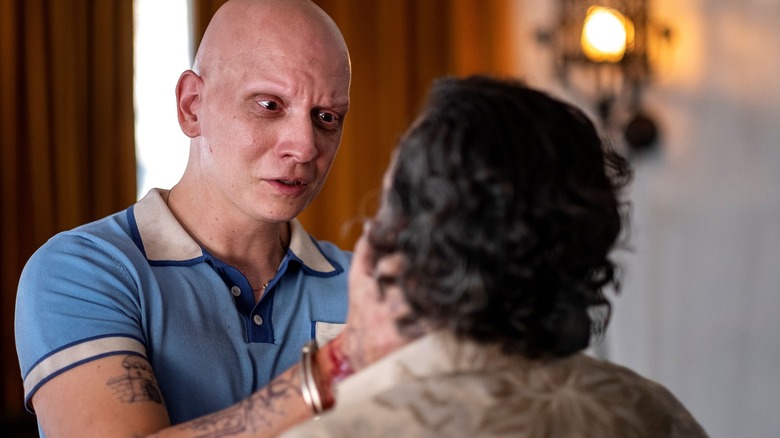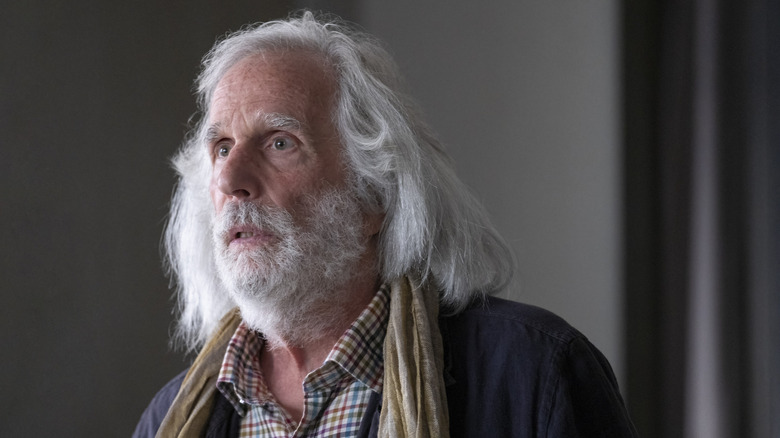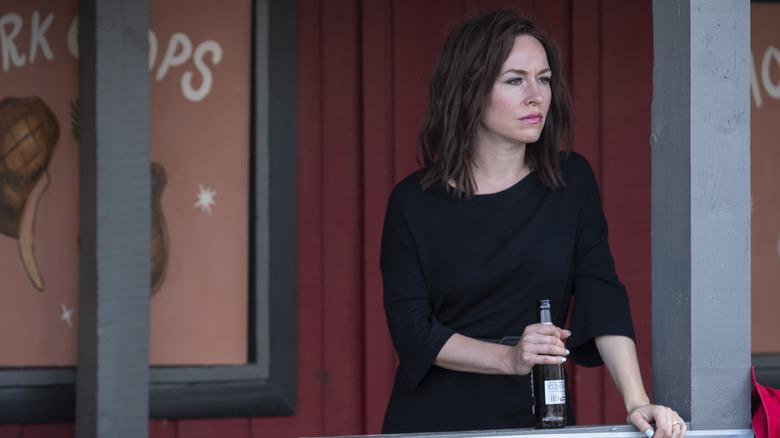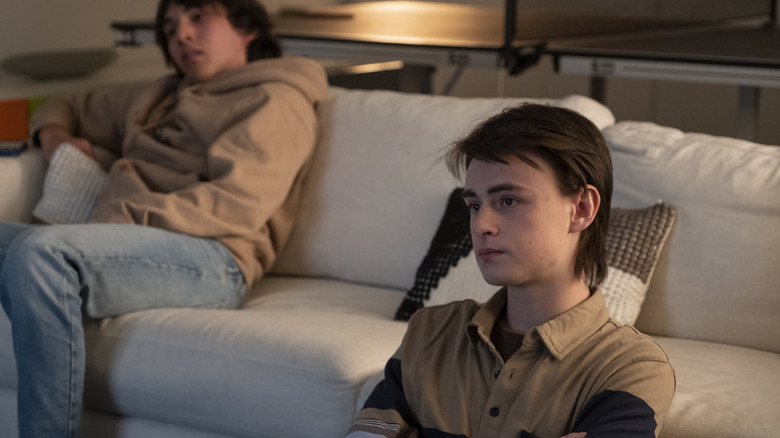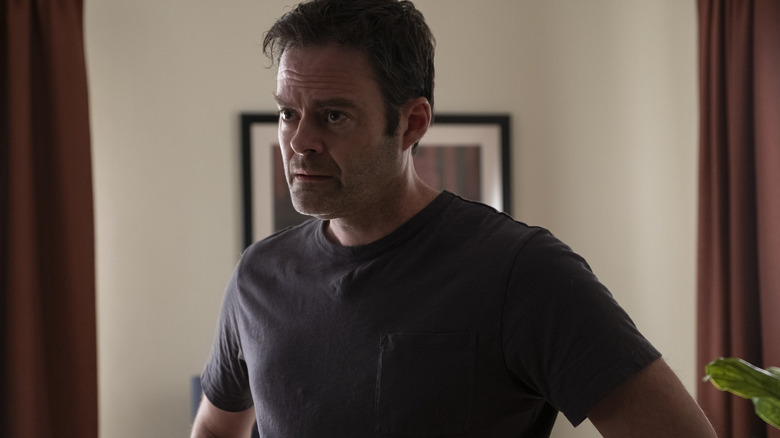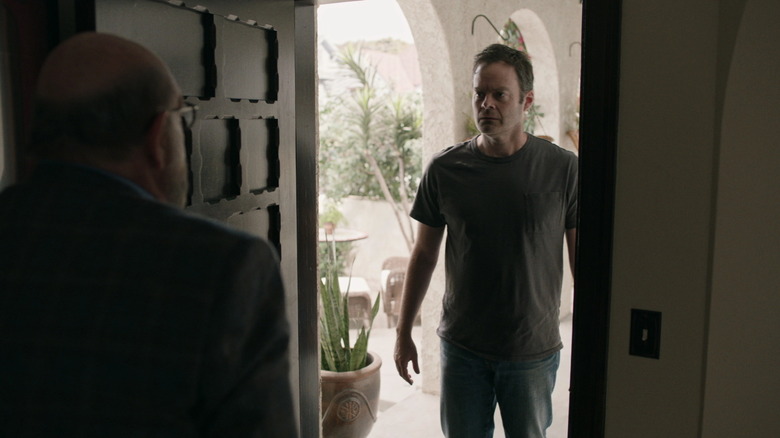The Ending Of HBO's Barry Explained
After multiple award-winning seasons of defying the odds in the repeated face of death, hitman-turned-actor-turned-fugitive Barry Berkman (Bill Hader) finally saw his story come to a close with "Wow," Episode 8 of the 4th and final season. Below, a (spoiler-heavy) breakdown of the final moments of the much-buzzed-about HBO series.
When a depressed Barry first stumbled upon the amateur acting class of Gene Cousineau while carrying out a hit on one of the students, he believed he'd found new purpose. Ready to leave his life of killing behind for good, Barry traded in handler Monroe Fuches (Stephen Root) for an equally self-absorbed, egotistical mentor — this time in the form of washed-up actor Gene. When Gene later discovered the horrors of Barry's double life at the end of Season 2, and even when Mr. Cousineau teamed up with Jim Moss (Robert Wisdom) to set Barry up for his arrest at the end of Season 3, Barry still believed the two shared a deep, father/son love for one another.
But it wasn't a trick — and in the final moments of "Wow," as Barry finds himself starring down the barrel of a .38 Special revolver with Gene on the other end, it finally hits him. Not just the bullet, but the matter-of-fact realization that out of everyone who's ever tried to kill him — Chechen mob bosses, a taekwondo master, his opposition in the military, biker gang members and more — it's Mr. Cousineau who will end up pulling the trigger.
As the curtain closes on the crime dramedy "Barry," here's a breakdown of everything that happened — and whether it's worthy of a standing ovation.
What you need to remember about the plot of Barry
No matter how hard Barry tries to distance himself from his profession as a hitman, he can't seem to escape his past. After his hit on acting student Ryan Madison (Tyler Jacob Moore) goes wrong, Barry finds himself in debt to the Chcheyan mob. Just when the police close their investigation into Ryan's death and Barry thinks he's gotten off scot-free, lead investigator and Gene's new romantic partner Janice Moss (Paula Newsome) makes a realization about Barry's involvement. Before she can turn him in, Barry kills her and spends the rest of Season 2 trying to hide his truth in more ways than one. However, Barry can no longer keep up the facade when Fuches reveals to Gene that Barry is Janice's killer.
In Season 3, Barry has hit a new rock bottom, and the pursuit of acting no longer remains a priority. While he's busy trying to keep Gene silent, Fuches is out exposing Barry to all the families of Barry's victims. One of the people Fuches approaches is Jim Moss, Janice's father, who teams up with Gene in an elaborate setup to catch Barry red-handed. In the fourth and final season, an imprisoned Barry escapes and starts a family with series-long girlfriend Sally Reed (Sarah Goldberg), while they both run from the law — now, with a son in tow. But even after eight years of freedom, Barry can't help but be pulled back into his killing ways when a movie about his crimes threatens this new life.
What happened at the end of Barry?
While Barry is in L.A. on a mission to execute Gene for his involvement in the movie, Sally and their son John (Zachary Golinger) are taken hostage by Chechen mafia leader NoHo Hank (Anthony Carrigan) , who hopes to lure Barry to his death in retaliation for Barry's repeated betrayals. The unlikely duo of Fuches and Hank team up, but instead of killing Barry, the two gangs end up in a shoot-off with each other, leaving Hank dead. Fuches shields John from harm, and the two walk away unscathed.
When Barry arrives on the scene, he's greeted by John as Fuches watches on in the shadows before disappearing. Now reunited, Barry, Sally, and John are ready to plan the next chapter of their lives, but Sally is concerned about Gene being set up for the murder of Janice. She urges Barry to turn himself in, but when he refuses, Sally disappears during the night, taking John with her. Barry goes to Gene's house looking for his family, doesn't find them, then has a change of heart and is ready to turn himself in; before he can, Gene shoots Barry dead.
Another time jump reveals an older Sally, now a single mother working as a high school theater teacher. In the final scene, a noticeably-older John goes to a friend's house to watch "The Mask Collector," the biographical movie about Barry's life, which portrays Barry as a hero and Gene as the mastermind behind it all. Although John may remember events differently, he can't help but feel relief over his father's distorted legacy.
Barry and Sally's lives as fugitives
Halfway through Season 4, the characters of "Barry" go through drastic changes after an eight year time jump that sets up the question: What if everyone got what they wanted? As it turns out, the grass is always greener on the other side, but for Barry and Sally, who now live in the middle of a secluded desert, there isn't much grass anyway.
Now going by the names Clark and Emily, Barry and Sally are raising a son who has no idea about his parent's past, let alone their real names (or his mom's real hair color). This new life and family are all Barry has ever wanted, with breadcrumbs being dropped far back as Season 1, when Barry imagines a future with a kid. Turning to religion, Barry believes he's finally redeemed himself, but the slightest threat to his new life sends him right back to his old ways.
For Sally, her decision to run away with Barry was rooted in safety, a feeling she'd been chasing long before Barry entered the picture. Between her abusive ex-boyfriend, her toxic family, and the trauma of killing someone in self-defense, Sally only feels safe when she's with Barry. But with accumulated trauma, guilt, and regret, Sally falls into depression and alcoholism. Her situation becomes so desperate that she nearly turns herself into the police after following Barry to L.A., then again in the finale when she urges Barry to turn himself in.
Where Mr. Cousineau, Hank, and Fuches have been for the past eight years
On the surface, it seems like Gene Cousineau has returned to L.A. as a changed man after hiding out in Israel for the past eight years. When the biographical movie about Barry is announced, Gene comes out of hiding to try and put a stop to the glorification of Janice's death. However, this new mindset doesn't last long; when a man posing as Daniel Day-Lewis' agent contacts Gene about the actor portraying him in the movie, Gene reverts to his narcissistic self, leading to his downfall.
Meanwhile, Fuches emerges from prison, now embodying the persona of "The Raven" and finally gaining the respect and control he believes he deserves. After near-death beatings by the police trying to extract information about Barry's whereabouts, Fuches impresses the other prisoners with his loyalty and toughness, despite not actually knowing where Barry escaped to. Fuches gathers his gang and approaches Hank, who has now successfully achieved status as the leader of a lucrative construction sand empire, but at what cost?
Fuches is looking to offer his services in exchange for Barry. It's assumed he's planning on getting back at Barry for leaving him for dead in prison, but when they meet face to face, Fuches surprises everyone by saving John and returning him to Barry without any trouble, possibly making Fuches the most redeemed character of the series. "He was always a conniver and a ne'er-do-well, and once he got this respect, it changed him... that's kind of the central theme of the show... by the end of the show, everybody has been changed into somebody else," Root says of the final scenes with his character.
Hank and Cristobal's tragic love story
When leaders of rival Chechen and Bolivian mafias Hank and Cristobal Sifuentes (Michael Irby) made their relationship official in the first episode of Season 3 ("forgiving jeff"), it thrilled many. By the end of the season, the forbidden lovers are finally free of their oppressors and spend the first half of Season 4 investing in the lucrative business of construction sand. With the help of some rival gang members, Hank and Cristobal are on their way to leading their own empire until Hank goes behind Cristobal's back and kills off their associates at the demands of the Chechen elders, nearly killing Cristobal in the process.
Appalled by Hank's actions, Cristobal breaks things off during a tearful sequence, but — as Hank tries to warn — Cristobal knows too much. Cristobal walks out the door and is killed on the spot. Even after the time jump and fully embracing his violent side, the death of the love of his life hangs over Hank's guilty conscience. At the center of NoHoBal Industries, a gold statue commemorating Cristobal stands tall, representing Hank's denial.
During the stand-off between Fuches and Hank, a newly-transformed Fuches insists Hank own up to the horrific killing of his lover. Unable to overcome his shame, Hank doubles down and chooses death over honesty. "
"With Hank in those final moments underneath the statue of Cristobal," Carrigan says of the scene, "It's him seeing very clearly what he has lost in this life based on those choices. There's something beautiful about him ending it holding Cristobal's cold, metal hand — but there's something really terrifying about it."
How Cousineau was framed for murder
In the world of "Barry," it seems as though law enforcement is good at one thing and one thing only: fabricating false narratives.
In Season 1, before Janice discovers the truth about Barry, the police conclude their investigation by framing Ryan and former marine Taylor Garrett (Dale Pavinski) as criminal kingpins. By Season 4, Episode 7, "A Nice Meal," leading up to the finale, they've concluded that Gene was the mastermind behind Janice's death based on the hush money given to Gene by Barry. It may seem like a reach to jump to this outlandish conclusion, but law enforcement paints a surprisingly convincing picture.
Back in "Chapter Six: Listen With Your Ears, React With Your Face" (Season 1, Episode 6), Taylor stashes Chechen drug money in Barry's bag without his knowledge. When Barry discovers it during acting class, he hides it in the theater, which Janice later finds after killing a Chechen mobster found at the theater who happened to be following Barry around.
According to law enforcement's version of events, these Chechen ties to the theater point to Gene as someone who's been working with the Chechens this whole time. When he discovered Janice was onto him, he hired Barry to kill her at his cabin. A good lawyer likely could've poked holes in this theory, especially with the confession Barry nearly provided — but before Barry could turn himself in, Gene got ahead of himself and secured his devastating fate.
Sally's trauma
Besides Fuches, Sally is the only other character who fully accepts herself as morally corrupt. The self-absorbed aspiring actress has come a long way since the pilot.
"She is someone who's experienced major trauma and has no language to deal with it," Goldberg tells The Los Angeles Times.
At first, Sally uses acting as an outlet, but after her show's cancellation, her ruined reputation, and the near-death experience of killing someone in self-defense, Sally feels she has nowhere left to turn. When Barry comes to her after his prison escape, it's Sally's idea to run away with him. Her confession in "Bestest Place on Earth" (Season 4, Episode 2) explains why. "I feel safe with you," she admits to Barry during her prison visit.
As it turns out, safety is not enough to prevent Sally from hating her new family life as an outlaw. She goes through the motions of her repetitive, isolating days, unable to connect to her partner or son. During her tearful confession to John in the finale, she makes some headway, and in the final time jump, Sally properly accepts her role as John's mother.
"She finally makes an unselfish choice, " says Goldberg. "She chooses this child that she didn't even want and walks away from Barry. She still needs the reassurance from her child the same way she needed it from Barry. That narcissism and insecurity is still there. However, she's up there with the students getting real joy out of having made this show."
Rewriting history
When John joins a friend for a sleepover in the final scene, the two watch "The Mask Collector," the biographical movie about Barry's life that has apparently come a long way since its initial announcement.
In the film, Mr. Cousineau is depicted as a mastermind criminal kingpin and Barry as the innocent hero. It's overly serious, violent, and highly dramatized, making it the perfect blockbuster. Although John may know better, having lived through some of the movie's events and hearing Sally's confession, his teary eyes and faint smile indicate he'd much rather believe the movie's falsehoods and is relieved to know the rest of the world does too.
This isn't the first time "Barry" has satirized Hollywood culture; in fact, it's been one of the show's central themes. Despite being a mediocre actor and, even more disturbingly, a cold-blooded killer, Barry had no trouble securing acting roles — like when he lands his first acting job in a huge feature by chance and gets offered an audition on the spot when trying to help Gene repair his reputation. The show's satirical approach to Hollywood comes full circle in the biopic's distortion of reality for the sake of entertainment through the glorification of a corrupt, violent man.
Did Barry redeem himself?
Lying in their motel bed together with their son sleeping between them, Barry and Sally have the opportunity to continue hiding from the law and start the next chapter of their lives, something Barry considers to be proof of his redemption. They've been given a second chance, and he didn't even have to kill for it. But Sally sees things differently. "The only way to be redeemed," she tells Barry, "is by taking responsibility for what you did." She insists Barry turn himself in to spare Gene from taking the fall for Janice's death. Barry isn't interested — and during the night, Sally leaves with John.
When Barry goes looking for his family at Mr. Cousineau's house but is unable to find them, he realizes he has no other choice. He decides to turn himself in; he never gets that far. Whether or not Barry would've gone through with finally leaving his life of violence behind and taking responsibility doesn't seem to matter in the end; Hollywood has decided to uphold his questionable legacy of redemption.
What has the cast and crew of Barry said about the ending?
"I knew how the ending was going to be from season two," show creator Bill Hader said in a post-mortem of the finale. "Weirdly, how we got there is completely different than what I thought it would be, but then the actual ending is exactly what I thought."
When writing with co-creator Alec Berg and the other writers, Hader said he always wanted to stay true to the characters. "Don't do it for what you think people want to see, do what is right for the story." In addition to writing, Hader directed every episode of Season 4.
Although Hader has said he believes in never saying never, it's unlikely the "Barry" universe will be expanded anytime soon. Nevertheless, the cast has some theories.
When asked if Fuches knows about "The Mask Collector," Root said, "I think he does know and I think he probably was annoyed that he wasn't in it."
As for what Mr. Cousineau thought of the movie, Henry Winkler replied, "Gene would have hated it. He has always wanted to be in a movie, but not that way. That's not the way he saw himself." On the other hand, Gene's life behind bars may be hopeful. "If he ever comes back to his sense," Winkler speculated, "I see him starting a theater club in prison,"
